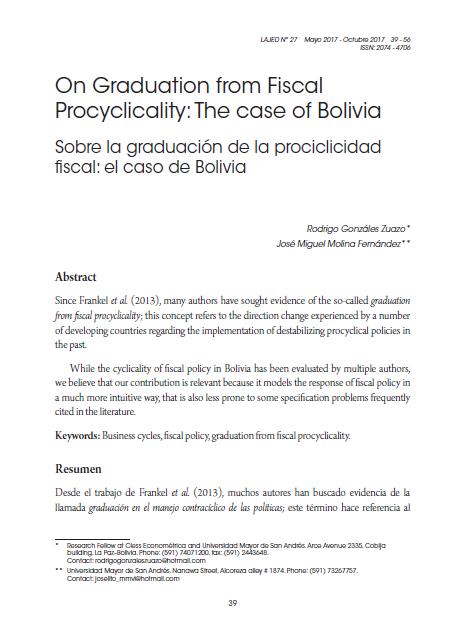Sobre la graduación de la prociclicidad fiscal: el caso de Bolivia
DOI:
https://doi.org/10.35319/lajed.20162751Palabras clave:
Ciclos económicos, política fiscal, graduación de la prociclidad fiscalResumen
Desde el trabajo de Frankel et al. (2013), muchos autores han buscado evidencia de la llamada graduación en el manejo contracíclico de las políticas; este término hace referencia al cambio de dirección experimentado por una serie de países en desarrollo con respecto a la implementación de políticas procíclicas desestabilizadoras en el pasado. Si bien la ciclicidad de la política fiscal en el país ha sido evaluada por múltiples autores, creemos que el análisis que presentamos a continuación es relevante porque modela la respuesta de la política fiscal de una manera mucho más intuitiva y robusta a ciertos problemas de especificación frecuentemente citados en la literatura.
Descargas
Citas
Alberola, E., I. Kataryniuk, A. Melguizo & R. Orozco. 2016. “Fiscal policy and the cycle in Latin America: the role of financing conditions and fiscal rules”. Bank for International Settlements Working Papers.
Alesina, A. & G. Tabellini. 2005. “Why Is Fiscal Policy Often Procyclical?” Working Papers 297, IGIER (Innocenzo Gasparini Institute for Economic Research), Bocconi University.
Alesina, A., F. R. Campante & G. Tabellini. 2008. “Why is Fiscal Policy Often Procyclical?” Journal of the European Economic Association, MIT Press, 6(5), 1006-1036.
Ardanaz, M., A. Corbacho, A. Gonzáles & N. Tolsa Caballero. 2015. “Structural fiscal balances in Latin America and the Caribbean: new dataset and estimations”. IDB Working Paper Series Nº IDB-WP-579.
Barro, R. 1979. On the Determination of Public Debt. Journal of Political Economy, 87, 940-971.
BCB. 2014. El rol estabilizador de la política fiscal en el nuevo modelo económico boliviano. Banco Central de Bolivia. La Paz, Bolivia.
Blanchard, O. & R. Perotti. 2002. “An Empirical Characterization of the Dynamic Effects of Changes in Government Spending and Taxes on Output”. Quarterly Journal of Economics, 117, 1329-1368.
Caballero, R. J. & A. Krishnamurthy. 2004. “Fiscal Policy and Financial Depth”. Depth. NBER Working Paper No. 10532.
Calderón, C. & K. Schmidt-Hebbel. 2008. “Business Cycles and Fiscal Policies: the Role of Institutions and Financial Markets”. Working Papers Central Bank of Chile, 481, Central Bank of Chile.
Calderón, C., R. Duncan & K. Schmidt-Hebbel. 2012. “Do good institutions promote counter-cyclical macroeconomic policies?” Globalization and Monetary Policy Institute, Working Paper 118, Federal Reserve Bank of Dallas.
Céspedes, L. F. & A. Velasco. 2013. “Was ftis Time Different? Fiscal Policy In Commodity Republics”. NBER Working Paper 19748.
Chari, V. V., L. J. Christiano & P. J. Kehoe. 1994. “Optimal Fiscal Policy in a Business Cycle Model”. Journal of Political Economy, University of Chicago Press, 102(4), 617-52.
Fatas, A., & I. Mihov. 2009. “fte Euro and Fiscal Policy”. NBER Working Papers 14722, National Bureau of Economic Research, Inc.
Fernández-Arias, E. & J. E. Pérez. 2014. “Grading Fiscal Policy in Latin America in the Last Decade”. Inter-American Development Bank Department of Research and Chief Economist Policy Brief, N° IDB-PB-216.
Frankel, J. A., C. Vegh & G. Vuletin. 2013. “On graduation from fiscal procyclicality”. a. Journal of Development Economics, vol. 100: 32-47.
Gavin, M. & R. Perotti. 1997. “Fiscal Policy in Latin America”. NBER, vol. 11: 11-72.
Gonzáles, R. 2016. “External Shocks, Dutch Disease and Informality in Bolivia”. Ciess Econométrica–Universidad Mayor de San Andrés. http://r4d.africantransformation.org/category/working-papers/.
Halland, H. & M. Bleaney, (2009). “Explaining fte Procyclicality of Fiscal Policy in Developing Countries”. Discussion Papers 11/09, University of Nottingham, CREDIT.
Hamilton, J. 2016. “Why You Should Never Use the Hodrick-Prescott Filter”. Department of Economics, UC San Diego.
Ilteztzky, E. 2011. “Fiscal policy and debt dynamics in developing countries”. Policy Research Working Paper Series 5666, fte World Bank.
Ilzetzky, E. & C. Vegh. 2008. “Procyclical Fiscal Policy in Developing Countries: Truth or Fiction?”. NBER Working Paper Nº 14191.
Kaminsky, G., C. Reinhart & C. A. Vegh. 2004. “When It Rains It Pours: Procyclical Capital Flows and Macroeconomic Policies”. NBER Macroeconomics Annual, edited by Mark Gertler and Kenneth Rogoff, Cambridge, MA: MIT Press.
Klemm, A. 2014. “Fiscal Policy in Latin America over the Cycle”. IMF Working Paper Western Hemisphere Department.
Lane, P. 2003. “fte Cyclical Behavior of Fiscal Policy: Evidence from the OECD”. a. Journal of Public Economics, 87: 1661-2675.
Mendoza, E. & M. Oviedo. 2006. “Fiscal Policy and Macroeconomic Uncertainty in Developing Countries: fte Tale of the Tormented Insurer”. Mimeo (University of Maryland and Iowa State University)
Puig, J. P. 2015. “Multiplicador del gasto público en Bolivia: una primera aproximación”. Latin American Journal of Economic Devolopment, N° 24. ISSN: 2074 - 4706, 47 - 78.
Riascos, A. & C. A. Vegh. 2003. “Procyclical Government Spending in Developing Countries: fte Role of Capital Market Imperfections”. Mimeo (UCLA and Banco Republica, Colombia).
Strawczynski, M. & J. Zeira. 2011. “Procyclicality of Fiscal Policy in Emerging Countries: the Cycle is the Trend”. Working Papers Central Bank of Chile N° 624, Central Bank of Chile.
Talvi, E. & C. A. Vegh. 2005. “Tax Base Variability and Procyclical Fiscal Policy in Developing Countries”. Journal of Development Economics, 78(1), 156-190.
Ugarte, D. 2016. “Ciclicidad de la política fiscal en Bolivia”. Cuadernos de Investigación Económica Boliviana, Ministerio de Economía y Finanzas Públicas, 7-53.
Valdivia, D. 2014. “Posición fiscal, monetaria y control de la brecha inflacionaria y del producto: evidencia empírica para Bolivia”. MPRA Paper.
Vegh, C. & G. Vuletin. 2014. “fte Road to Redemption: Policy Response to Crises in Latin America”. IMF 14 TH Jacques Plak Annual Research Conference. https://www.imf.org/external/np/res/seminars/2013/arc/pdf/vegh.pdf.
------ 2016. “To be countercyclical or not? ftat is the question for Latin America”. VOX CERP´s Policy Portal. http://voxeu.org/article/be-countercyclical-or-not-question-latin-america.
Woo, J. 2009. “Why Do More Polarized Countries Run More Procyclical Fiscal Policy?”. The Review of Economics and Statistics, 91(4), 850-870.





